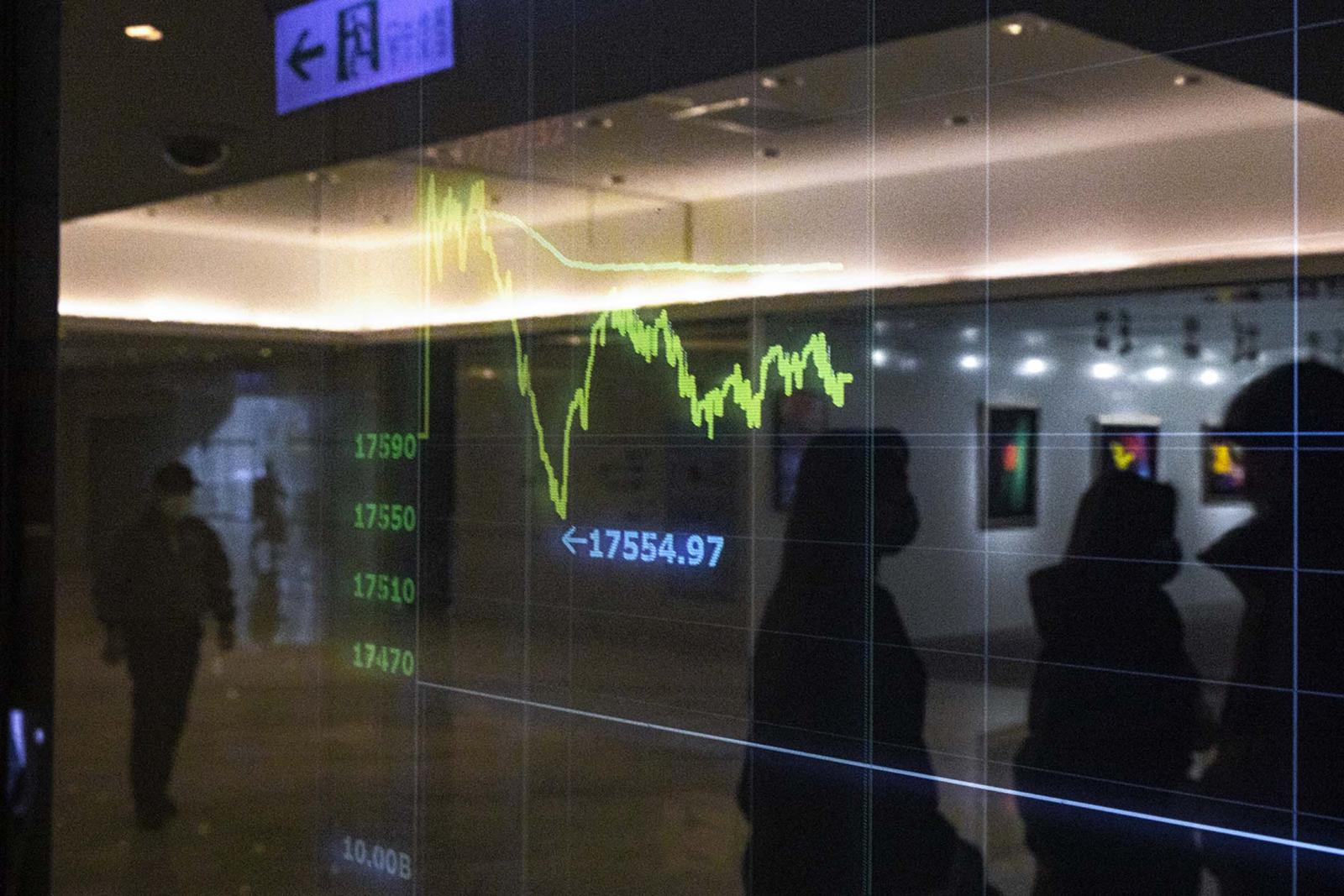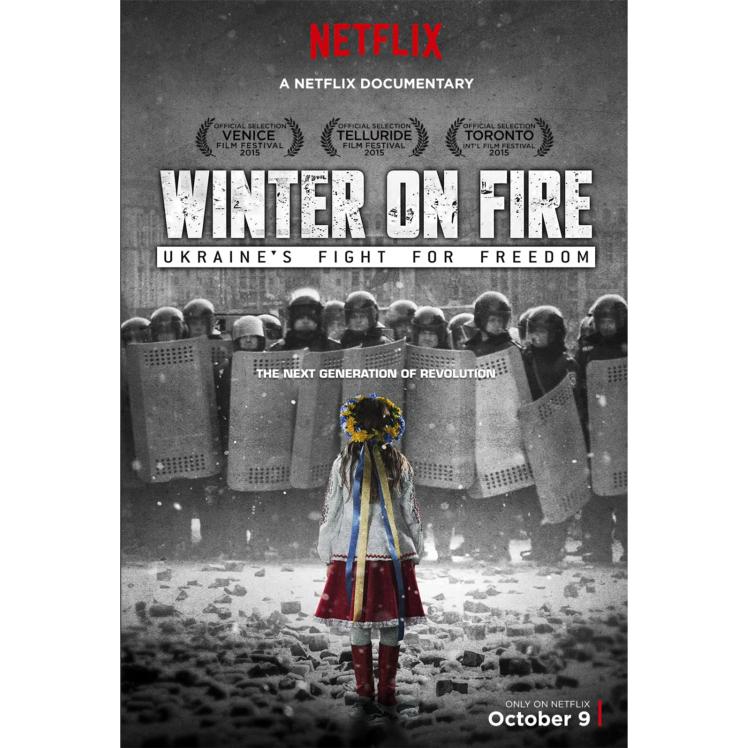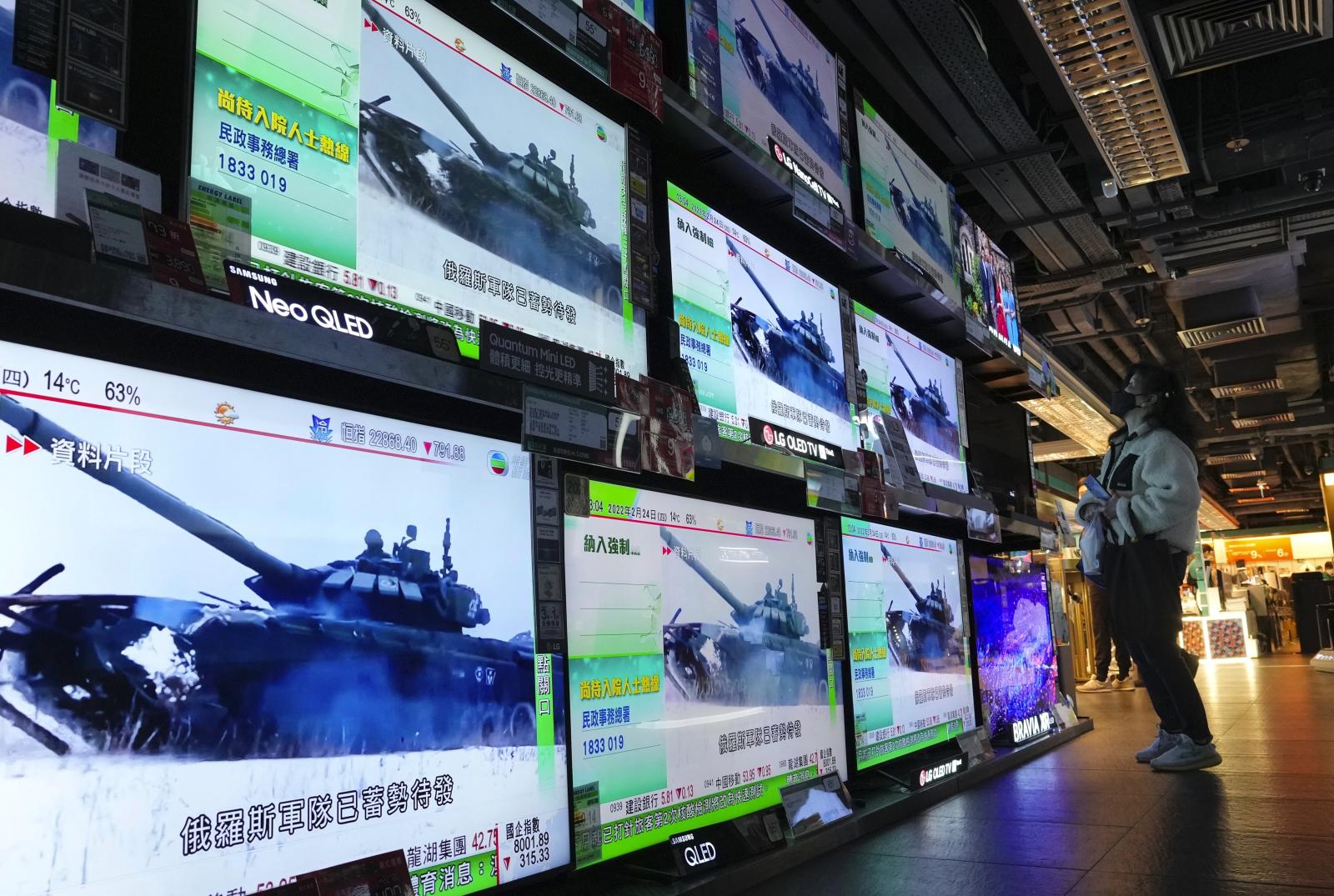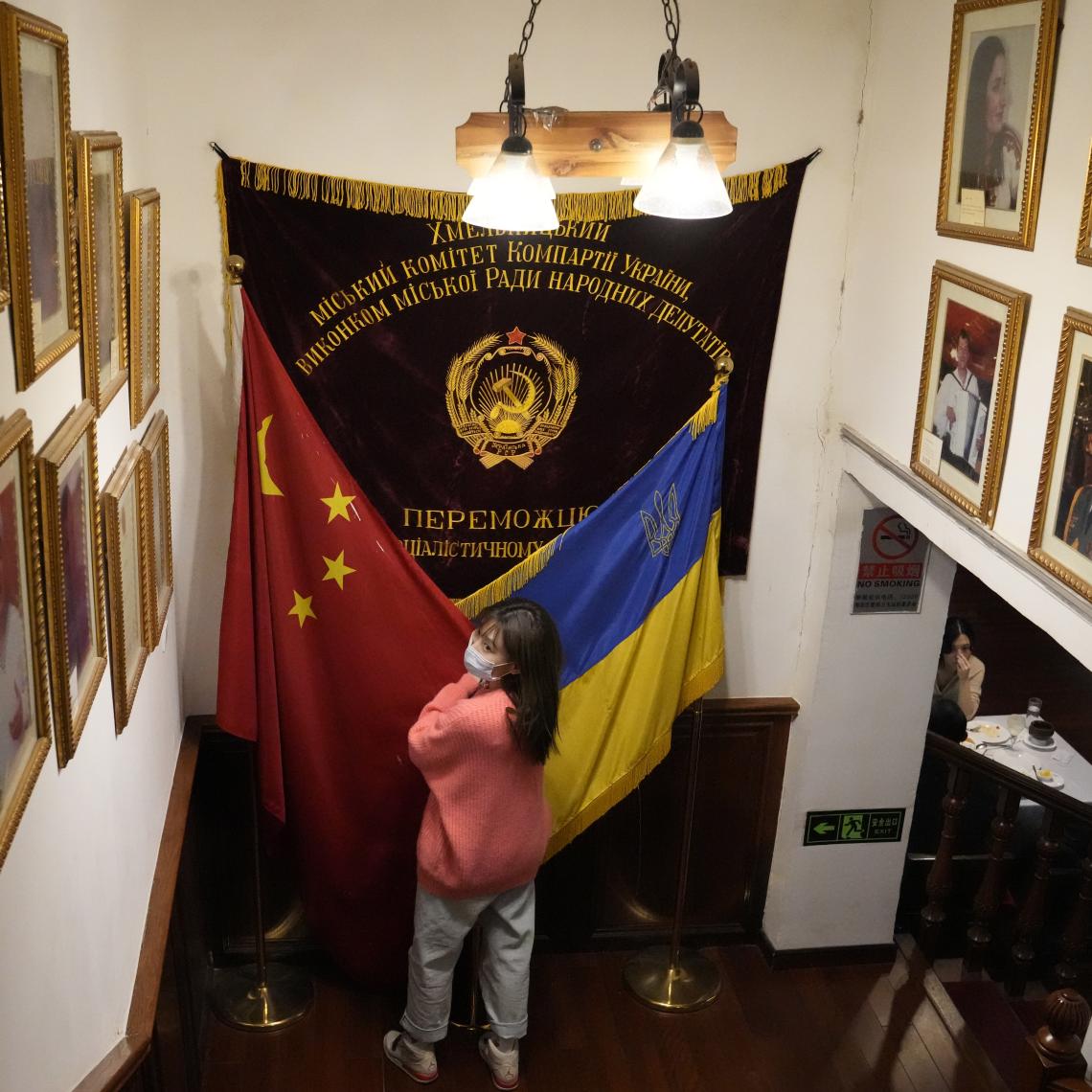
A diner at a Ukrainian restaurant poses for a photo in front of its flag display. Beijing, China, 24 February (Ng Han Guan / AP / TPG images)
Public opinion roundup: Ukraine crisis viewed in China, Hong Kong and Taiwan
While Putin is cheered as "Vladimir the Great" in mainland China, people in Taiwan ask whether Ukraine today is going to end up being Taiwan’s fate tomorrow
With war breaking out between Russia and Ukraine, Initium Media takes a tour of the mainstream media landscape in mainland China, Taiwan and Hong Kong. The ugly, the beautiful, the hateful and the kind: these continue to remind us how multi-faceted human nature is, that we can be perpetrators of violence or defenders of dignity and freedom. Which path will you choose?
China: confidence in major power status
In the early hours of 24 February (Moscow time), Russian President Vladimir Putin announced a “special military operation” in the Donbas region in Ukraine. Explosions were heard in several areas of the Ukrainian capital of Kyiv from around 4 a.m. Ukrainian authorities claimed that as many as 10 cities had suffered airborne attacks by dawn and proceeded to declare nationwide martial law, cutting off diplomatic relations with Russia that same afternoon. A steady feed of news updates on the Ukraine-Russia crisis drove discussions on key social media from around noon onwards.
China Foreign Ministry calls for rationality and objectivity:Russia is not “invading”
At a regular Ministry of Foreign Affairs press conference on 24 February, MFA spokeswoman Hua Chunying responded to follow-up questions from journalists by repeatedly refusing to label this action by Russia as an “invasion” or “aggression” but rather echoed the Russian framing of a “special military operation”. Hua told AFP and Reuters journalists to take the time to properly read the detail of Vladimir Putin’s speeches and called on them to “look at matters from a rational and objective perspective”, also stating “I’m not the spokesperson for the Russian Foreign Ministry and will not speak for their position”.
Continuing with the idea of “fanning the flames”, Hua Chunying turned her fire on the USA: “(the US) started the fire and fanned the flames, how are they going to put out the fire now?”. The previous day, Hua Chunying had said in this context that there is a need to “properly address each other’s legitimate security concerns”. Furthermore, concerning the US’ expansion of NATO, she rhetorically asked, “did it ever think about the consequences of pushing a big country to the wall?” To emphasize the “peaceful” nature of Russia's operation, Hua Chunying also frequently cited Russian talking points: Russia “will not conduct missile… or artillery strikes on cities”. Figures published by Ukraine showed civilian casualties had already occurred.
‘America fanning the flames’ was the main theme underpinning reporting on Ukraine in January by Chinese state media, many of whom saw the USA’s withdrawal of its diplomatic personnel, arms sales to Ukraine and travel warnings against Ukraine-Russia border regions as attempts to ‘smear Russia’ and ‘stoke the fires’. They implied that Russia had no plans to invade, but the US was deliberately raising tensions and creating panic.
Beijing News, managed by the Beijing Communist Party Propaganda Department, accidentally leaked the editorial ‘instructions’ relating to Ukraine on the Weibo social media channel of its international news program on 22 February: “do not publish content detrimental to Russia or that is pro-Western”. This kind of ‘instruction’ is generally a rigid demand handed down by propaganda departments. The post was quickly deleted.
The 24 February Russian invasion of Ukraine was clearly at odds with the news agenda Chinese official media had adopted. While the Ministry of Defense in Moscow declared on 16 February that its troops were withdrawing, Western states warned that Russian units were still moving towards the border. CCTV (China Central Television) followed the Russian line, heading its reporting on the conflict “US attempting a distraction by fomenting hot war?”. On 18 February the official chinanews.com.cn portal mockingly reported that Joe Biden’s ‘prediction’ and ‘script’ of a Russian invasion had not come true. A further report by CCTV on 20 February stated that the "Russian withdrawal" had put the lie to US rumor-mongering about an invasion.
Recycled Russian narratives of the war by Chinese officialdom have dominated internet opinion in mainland China. The hashtag #RussiaInvadingUkraine (#俄罗斯入侵乌克兰) was quickly blocked on weibo, and mainstream internet users quickly came to the following value judgment: the US has been fanning trouble, Russia has legitimate security concerns of its own, Ukraine brought it all on itself by siding with the oppressor, and China is powerful.
Chinese public: indifference stemming from self-image as a major power
Hua Chunying’s defense of Russia has not received much attention on Chinese social media, which has focused instead on her railing against the US’s hardline stance. Her lines, “NATO still owes the Chinese people a debt of blood” and “when it comes to respect for state sovereignty… the US is in no position to tell China off” rapidly became some of the top trending searches on weibo. The Chinese Ministry of Defense also generated a trending item at its press conference: “if there’s just one day of provocation from the Taiwan independence forces, the People’s Liberation Army won’t hesitate a moment before taking action”. Current Chinese public opinion’s sense of US agency has been stronger than the agency it sees Russia and Ukraine as having.
Comments to weibo posts on Ukraine by the official “CCTV News” account saw a lot of extrapolation to Taiwan: “what’s happened in Ukraine is what’ll happen to you!” The strict censorship regime left untouched the ubiquitous comments comparing Ukraine to Taiwan and yearning for a ‘PLA takeover soon’, despite Hua Chunying’s statement the day before that “Since the Ukraine crisis broke out, Taiwan has been frequently mentioned by some people. Some of their remarks fully reveal their lack of knowledge of the history of the Taiwan question.”
The Chinese Embassy in Ukraine issued a security warning to Chinese citizens and businesses in the country on the afternoon of 24 February telling them to “stay at home if possible” and that if they were on the road they could “clearly display a Chinese flag on their vehicles”. The Embassy’s warning quickly trended online, with the Chinese flag’s use in this war zone feeding into symbolic perceptions of great power status nurtured by the film Wolf Warrior; for Chinese media and internet users, the five-starred red national flag has an other-worldly power, with one internet user’s perception of the world order leading them to conclude that given China’s influence, there will be a ceasefire until China has evacuated all its citizens. This line of reasoning quickly led people to warn against Koreans trying to pass themselves off as Chinese and misuse Chinese flags. In the morning of 25 February, the Embassy in Kyiv announced an evacuation of Chinese citizens.
On the video site Bilibili, popular with young users, one commenter became extremely popular by saying Russia had “given China major face by waiting till after the Winter Olympics”; a popular viewpoint has been perceptions of Chinese power within the framework of friendly relations with Russia, which does not exactly echo the Ministry of Foreign Affairs’ line that “China-Russia relations are based on… non-alliance”. However this notion of ‘giving face to China’ is debatable, since the customary Olympic Truce UN resolution which China submitted for the Winter Olympics covers the period from seven days before the start of the Olympic Games to seven days after the end of the Paralympics – a period which has not yet ended.
The earliest topic to trend on the Chinese internet following the start of the Russian operation was “Ukrainian beauties”(乌克兰美女). Social media quips such as “I’d like to take in a Ukrainian girl from 18-24 years old so she’s not harmed by the war”, “give a home to displaced Ukrainian beauties” and “all I care about is whether China has secure supplies of Ukrainian totty” abounded. Major-power confidence combined with male reproductive insecurities with a focus on a more specific object of desire than Chinese flag-displaying: war-ravaged women from other lands.
This didn’t come from nowhere. “Ukrainian beauties all want to marry Chinese men” is a long-running Chinese social media topic. In the wake of the Feng County incident (where a trafficked woman was found chained up in an outhouse having borne 8 children), this topic has also earned its share of angry backlash, and embedded itself into the ongoing standoff between male and female voices online. By the evening of 24 February, this whole topic had been censored from weibo search results for “Ukrainian beauties”.
In an even more dramatic turn, the Chinese Embassy in Kyiv warned on 26 February of "an increase in extreme actions taking place in Ukrainian society" and that "you should not casually reveal your Chinese citizenship or display symbols of it". Some Chinese in Ukraine also bemoaned the fact that the Chinese internet's insulting discourse had been noticed in Ukraine, triggering a Sinophobic reaction. CCTV on 28 February accused "some foreign anti-Chinese media and accounts... (of) maliciously playing up Chinese netizens' comments". It can be assumed that narratives about “Ukrainian beauties” and "showing the national flag in the face of danger" will be wiped from the Chinese Internet for a while. (Updated by Echowall)
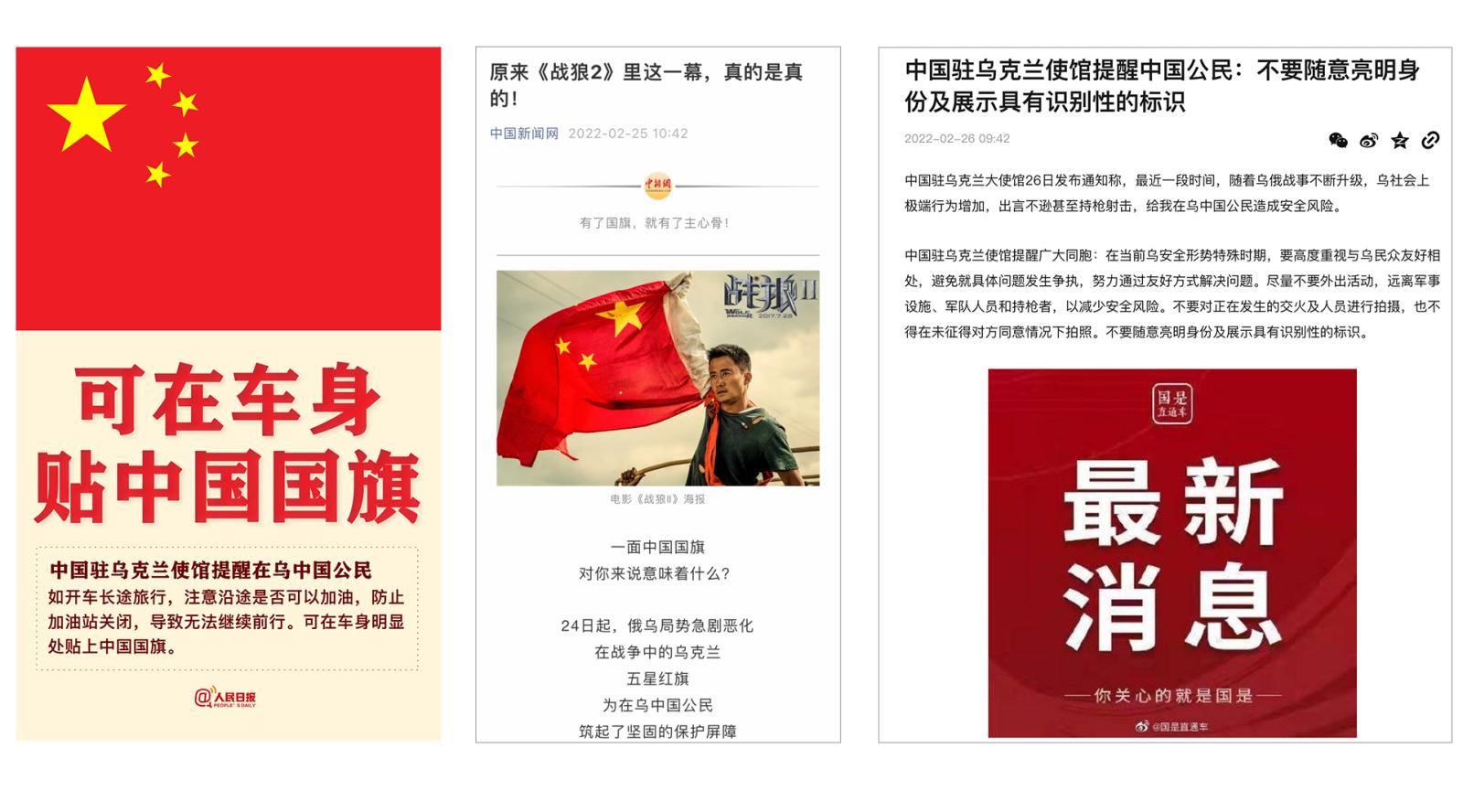
Screenshots from left to right: On the 24th of Feb., according to People’s Daily, the Chinese Embassy in Kyiv advised Chinese citizens in Ukraine to put the national flag on their cars; the next day, China Newsweek claimed that the plot of the movie Wolf Warrior 2 became a reality in Ukraine, as the national flag gave local Chinese "solid protection". A day later, the Chinese Embassy warned: "you should not casually reveal your Chinese citizenship or display symbols of it", Guangming Daily reported.
Spillovers from the information war: will ‘blitzkrieg’ overpower Ukraine?
Following the Russian invasion, Chinese official media went straight into war reporting mode. Unquestioning reliance on Russian official sources made mainland China a theatre for the former’s finely-honed information war tactics, quickly flooding it with unsubstantiated or refuted stories. Many people online seemed to believe that the war was already done and dusted.
Official media such as Global Times (Chinese edition) reported at around 1pm on 24 February that Russian forces had landed at the port city of Odessa. This was rejected as fake news by Ukraine. Numerous Chinese media meanwhile quoted Russian reports saying that Ukrainian naval and air forces had been completely destroyed within one hour. Credence was also given to Russian Defense Ministry statements that Ukrainian border forces had offered no resistance. Ukraine authorities gave a different take on all these stories.
A video circulated widely on social media of Russian paratroopers landing, as did one labelled as Ukrainian cities being bombed. The weixin social media public account You Ju Hecha (“evidence check”) demonstrated that the paratrooper video had been online since at least 2016, while the latter was video footage of an explosion in central Beirut on 4 August 2020. A widely-shared screenshot (24 February, 12:51) captioned as a story on finance site jin10.com relaying a Sputnik report, announced that “Russian forces have occupied Kyiv”, whereas the live feed from CCTV showed the city as being relatively calm.
Verifying stories is not seen as a pressing task by Chinese internet users, who are skeptical towards claims from the Ukrainian side. Chinanews.com.cn uploaded a weibo post on the afternoon of 24 February stating “Ukraine claims to have downed 6 Russian aircraft” to which the most upvoted comments read “is Russia aware of this?”, “crying for help while boasting of your prowess” and “forget ‘6 planes’, you’re almost done for”.
The idea of ‘blitzkrieg’ fits Chinese internet user’s perceptions of the current war, and an attack on Taiwan was also heavily discussed, with people thinking it could be just as easy: “send troops in the morning, reunify by lunchtime, do PCRs and issue IDs in the afternoon, all watch Xinwen Lianbo (main TV news program) together in the evening, raise the Chinese flag and play the anthem the next morning!”
“War is Peace” and the ‘anti-anti-war’ mentality
The ongoing information war has seen Putin further lionized in China as powerful, decisive and warrior-like, in line with the pre-existing image there of a hard-nosed red-blooded ‘Vladimir the Great’ (普京大帝).
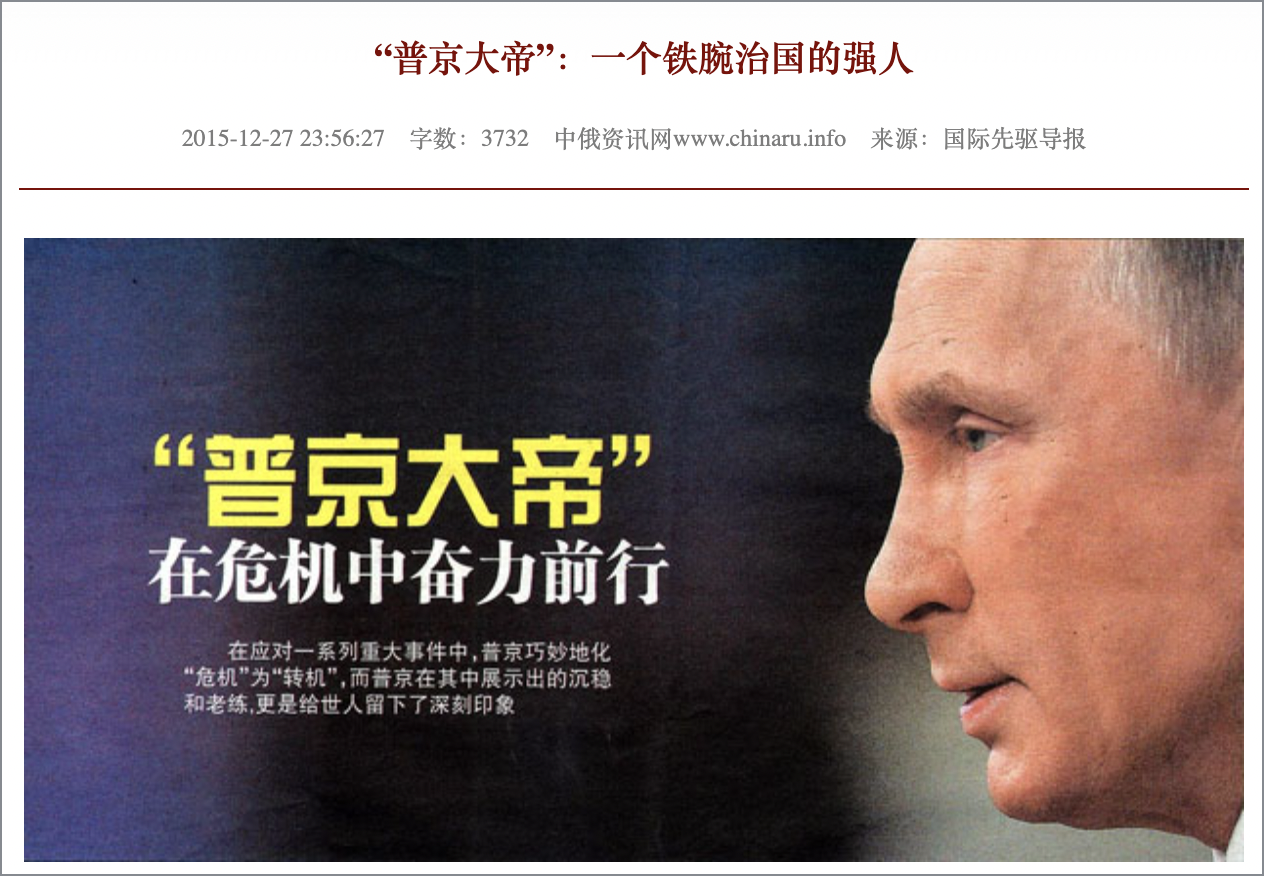
Chinese news outlets and social media often nickname Putin “Vladimir the Great”, such as in this 2015 report from the International Herald Leader, part of the Xinhua stable. It claims that “Vladimir the Great” has "never wasted a good crisis”.
“Vladimir the Great teaches you right and wrong”, “change your ways or you’re in for a slap”, “that’s what a real man’s like” – just some of the Putin hagiography montages posted on Bilibili by users infatuated with Putin’s charisma. In danmu onscreen reactions and below-frame comments, Putin is talked up as a solitary, resolute, gilded protector of his homeland.
A surge of new comments was posted on 24 February under a Bilibili montage of decade-old Putin footage: “great man”, “man-at-arms protecting the Russian people”, “I dread to think of a Russia without him.” The montage was posted at the end of January and had amassed 1.73 million views by the end of 24 February, on which evening the site said 2000-odd people were “currently watching”.
On the same day, the Communist Youth League’s Bilibili account posted a video of “Katyusha”, a Soviet patriotic song coined just before World War 2. This theatrical maneuver saw the CYL showered in ‘likes’. Despite China being Ukraine’s biggest trading partner, official and public opinion showed nary a hint of sympathy for the war-torn country, identifying much more with the Russian position.
Anti-war views were also strong. A weixin essay titled “All those who cheer on war are assholes” quickly amassed over 100,000 views (figure may have increased in the meantime) as well as cash ‘tips’ from over 4000 people. Many took the chance to add that Russia had annexed large parts of Chinese territory back in the day.
On weibo where clashes of view are easily sparked off, war opponents have been tarred as “Virgin Marys” (sympathizing indiscriminately, with no sense of right and wrong), whereas the war has been widely viewed as necessary, and a precondition to peace – “landing a punch to prevent hundreds of blows”. A Ukrainian competitor at the Beijing Winter Olympics had their weibo post of them holding a banner saying “No war in Ukraine” taken down. A weibo user argued that anyone who truly opposed war and wanted world peace should take a stance against the USA, gaining 43,000 retweets and 210,000 likes.
With the Russian line permeating Chinese public opinion, the US is seen as the real initiator of the war, with Russia just “defending the homeland”, with some comparing Russia’s pre-emptive attack to China’s mission to “resist US aggressors and defend Korea” during the Korean War. A cruder and more patriarchal take on social media says that Ukraine has divorced her husband (Russia) and is now openly flirting with the village strongman (USA) and pushing her ex-husband and children around, leading the ex-husband to be reluctantly forced to defend the children.
A stream of analogies has been coined since the invasion. Some users have adopted Putin’s characterization of the Ukraine authorities as “Nazis” and are at daggers drawn with other users who call the Russians Nazis instead. Yet other users agree with Putin’s speech in which he called Ukraine and Russia “one people” coming from the same origins, and the former go on to defend Russia on ethnic unity grounds.
Terms such as ‘geopolitics’, ‘imperialism’, ‘Nazis’ and ‘overall national interest’ are frequently tossed around, filling the footnotes to this war.
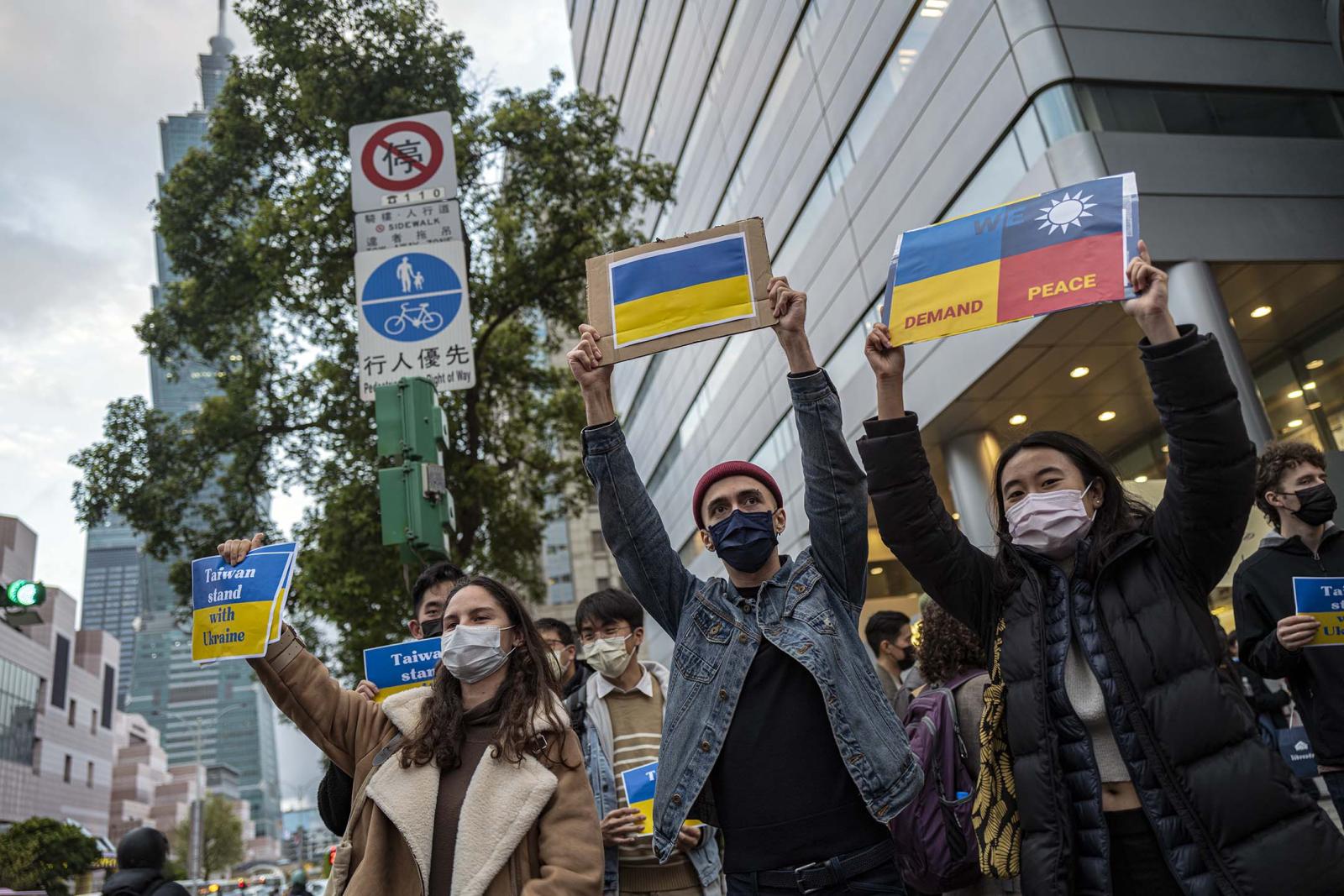
On February 25, 2022, in solidarity with Ukraine, people demonstrate in front of the Moscow Representative Office in Taipei. (Chan Cheuk-fai/ Initium Media)

